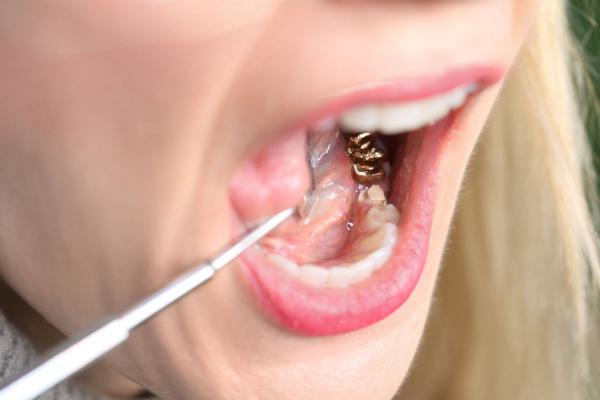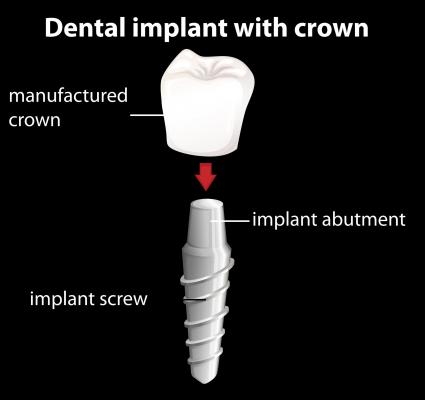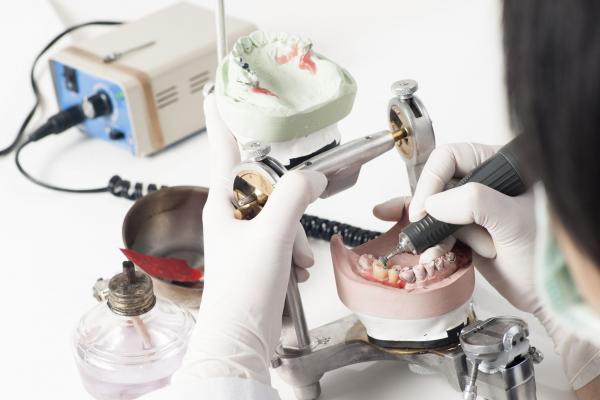1. The type of the crown
You have an option to choose from several types of crowns. Full ceramic, resin, porcelain fused to metal, and full metallic: stainless steel / a combination of alloys are a few of those. The price of your dental crown varies based on the option you choose.
- Resin Crown: A resin crown may cost you $300. It looks like your tooth but may wear out easily.
- Full ceramic crown: A full ceramic crown is tooth-colored and is great for the anterior/front teeth. It is esthetically appealing and costs $800 to $3,000 per tooth. A full ceramic crown made of zirconia may cost you $3,000 (this is the higher end of the price range, though) but will last really long. However, it may wear out the opposing tooth as it’s a strong material.
- Full metal crowns: As the name suggests full metal crowns are metallic and they are very strong and durable. They are great for posterior/back teeth, which exert chewing forces. Prefabricated stainless-steel crowns price starts around $150 per tooth. Your doctor may cement that over your prepared tooth while waiting for a crown from the lab. The waiting period can be between a few days and a few weeks. These stainless-steel crowns are durable and protect your tooth till the final crown is ready. These crowns are not recommended for long term use. A metal crown made of alloys may cost you $650 to $1,300. If you want a combination of alloys, the price varies accordingly. A full metal crown with a gold base may cost you an additional $100 to $200.
- Gold crowns: While esthetically not pleasing, many dentists like gold crowns. Gold is a great material, gold crowns are long-lasting and require only a small amount of your tooth to be removed before fitting. Even though gold crowns are expensive, they still might be a good choice for molar teeth.
- Porcelain fused to metal: Porcelain fused to metal crowns or PFM crowns have a metal base and porcelain on top of it. They are stronger than full ceramic crowns and bond better with your tooth. However, they look slightly opaque compared to full ceramic crowns. Depending on the quality, they cost $500 to $3,000.
- Same-day crowns: Same day CEREC crowns are more affordable than lab-made ceramic crowns. If your dentist offers same-day crowns, this is definitely an option to consider.
Full metallic crowns and crowns made of pure zirconia are the ideal choices, as they last longer.
If you opt for an economical crown you may feel that you are saving money, but you may need a replacement sooner.
Though a crown lasts for 5-15 years on average, full metallic and ceramic crowns may need fewer to no replacements.
While gold crowns doesn't look well, many dentists like them as the quality is great. However, gold crowns are expensive, they cost around $1,500.

2. The treatments which are done before placing a dental crown
You may need several dental procedures before placing a dental crown. It may include root canal treatment, implants, restoration/ fillings, scaling / tooth cleaning procedures, and consultation charges.
Restorations are fillings. You need them after your doctor cleans your decayed tooth. Few complex restorations need a crown to sustain.
Root canal treatment is a procedure wherein your doctor thoroughly cleans your tooth from within. The dentist removes the pain causing vital tissue. A root canal treated tooth needs to be covered with a dental crown to prevent the fracture of tooth.
An implant is like your tooth root. It is made of titanium or zirconia. A crown is placed on the implant to make the tooth restoration complete. If multiple teeth are missing, implants can support bridges or dentures.
Your doctor may charge:
- $40 to $120 for the consultation
- $20 to $120 for X-rays
- $500 to $2,000 for RCT of each tooth
- $1,000+ for each implant
Depending on these additional treatments, your costs can be in the $3,000 - $5,000 range for a single tooth.
If you need a dental implant to support the crown, prices might be around $2,500 and $5,000.

3. The type and experience of the dentist
In the U.S., periodontists are the specialists for dental crowns. If you opt to get your crown from them, it may cost you a little more.
You can also visit a general dentist for placing a crown. However, periodontists are trained to handle complex situations which may sometimes arise while placing a crown.
The experience level of your doctor also matters. An experienced doctor who is more skilled may charge you more for providing a specialized service.
4. The location of the dental practice
A practice in a prime location, like city centers, can charge you more than the one in the distant location, simply because their rent costs are higher.
If you are willing to travel an additional 10 - 30 minutes, you might find a practice that charges you less. Savings can be 10% or more.
5. Whether it’s a new crown or a replacement crown
For a replacement crown, you can save on the preparation cost and on additional treatments, such as implants / root canal cost.
But the actual crown cost may be the same. Though you may feel a replacement crown may cost you less, it takes the same amount of time for your dentist. Hence, he / she may charge you the same.
However, if your crown is perfectly alright, but is loose, or has come out, your dentist might be able to cement it back. That should cost you a lot less than a new crown.
6. Multiple sitting crown or single sitting crown
A single sitting crown may cost you somewhat less.
If you opt for a traditional, multiple sitting crown, your doctor will give you a temporary crown till your final crown is ready.
Same day crowns have a price advantage for several reason:
- one appointment is required - less time of the dentist needed to place the crown
- no impression is taken
- no need for a temporary crown
Your dentists needs to buy a CAD / CAM device to manufacture the crown, and same day crowns also require some experience from the dentist, they savings are usually not very significant.
However if you consider that because of the single appointment you don't have to take another day off your work, same day crowns might have a reasonable price advantage.
With same day crowns you can save dental lab costs.

7. Dental Insurance
If you have dental insurance, you can save some money on dental crowns. America spends a lot on healthcare when you compare it to any other country in the world.
Does Medicaid cover dental crowns?
Medicare and Medicaid have dental insurances that cover dental crowns. Medicaid is for those who belong to the lower income groups. Medicaid is jointly funded by the state and federal governments. 26 states offered Medicaid for the dental crown in February 2015. Call 1-800-MEDICARE to know what is the exact amount of insurance which will cover for your crown.
Does dental insurance cover dental crowns?
Usually, dental insurance covers 50% of the price of your dental crown. However, insurance companies often have a cap of $1,000 to $1,500 per year. You may want to split your treatment in two years by having half the treatment in December and another half in January.
Insurance companies cover medical necessity and not cosmetic procedures. However, most of the dental insurances do not cover any crown which is purely for esthetic purpose. They cover crowns made for medical necessities.
Insurance coverage is also different for replacement crowns.
Few of the dental insurances have a waiting period of a year. This is to make sure the insured does not misuse the insurance. However, certain insurances such as the group insurance which is by your employer has no waiting period.
8. Save money with dental discount plans
Dental discount plans do not have a cap like insurance plans. You can get as much treatment as you need and avail up-to 60% discount on all the procedures. There is usually no waiting period, no forms to fill, you simply pay the discounted price at the dentist. They also cost you less then insurance.
However you need to make sure you visit a dentist that participates in the particular plan you're member of. The companies offering discount dental plans have tens of thousands participating dentists nationwide, so it's quite likely you'll be able to find a participating dentist you like.
Discount dental plans can reduce crown prices by 50% - 60%. If you need one or more crowns, you should really consider signing up with one of the providers.

9. Dental schools, NGOs
Dental schools charge you less, if they charge you at all. However, you may have to wait longer for the appointment.
Since a student may be working on your crown, it may take longer. It may also be a little riskier but the procedure will be supervised by an expert at the dental school.
Few organizations and NGOs do the dental treatment for free.
10. Medical tourism
Some want to opt for medical tourism to save on the price of dental crown. Dental tourism is getting more and more popular nowadays, people from the US tend to travel to Mexico, Western-Europeans like to travel to countries like Hungary or Poland, Australians often go the India or the Philippines.
While the savings can be significant, you must also consider the risks of getting dental treatment from a dentist who lives hundreds or thousands of miles away from your home.
Final thoughts
So, how much you should pay for a crown? If you want a good quality crown (ceramic - e.g. emax, lava, zirconia - for the front teeth, pfm or gold for the back teeth) and you need no larger preparation works (like root canal), we think $1,000 - $1,500 in the US is a fair price for a dental crown. This could be £450 - £600 in the UK and ~$1,500 in Australia.
Some dentists may charge significantly more than this, you might want to shop around and get quotes from multiple clinics. However it's good to be cautious if you see much lower prices, the cheapest solution might not always be your best option.
A short video about the average cost of a dental crown. Duration: 1:26